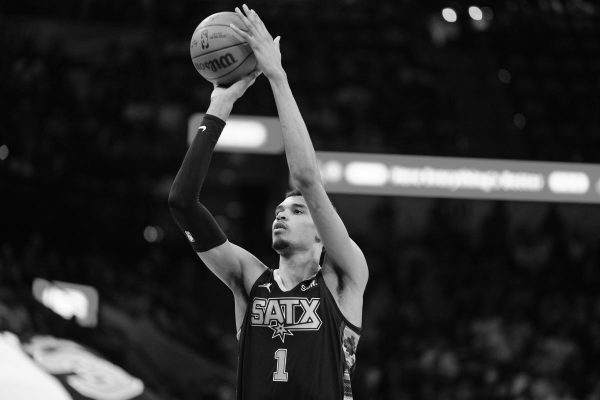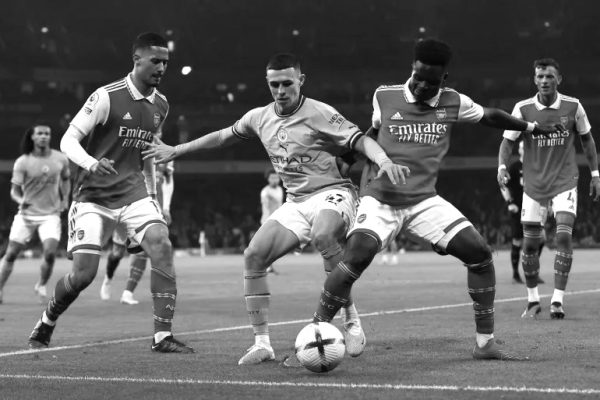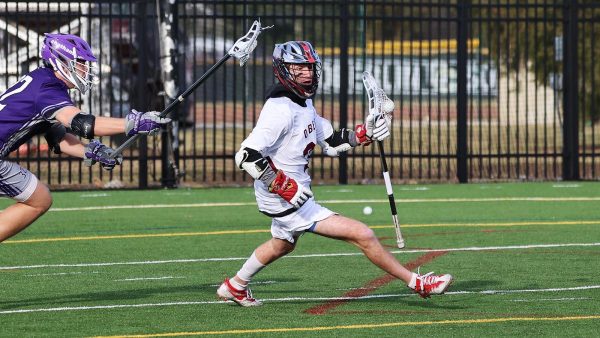“What’s My Name, Fool?” Creates Dialogue Around Race, Activism
English Professor Yago Colás hosted a discussion Wednesday in Dye Lecture Hall between the ESPN Around the Horn co-host and University of Maryland professor Kevin Blackistone, Grand Valley State University professor Louis Moore, Northeastern University professor Sarah Jackson, and University of Michigan’s prominent Fab Five member Jimmy King. The four panelists are all influential Black individuals who are deeply connected to the overlapping realms of sports and activism.
The talk opened with Colás’ introduction of the speakers. He then gave each speaker 10 minutes to share their thoughts on the overall topic. The first to speak was Blackistone, who came to Oberlin for the second time to discuss his ideas after his first presentation, “Don’t Believe the Type! The Demythification of Sports Media and Sports” last fall. He began by reminding the audience of Fox News talk show host Laura Ingraham’s now infamous remark to LeBron James, “Shut up and dribble.” Blackistone continued his presentation by pointing out that Ingraham used LeBron James as a target to attack Black athletes who are using their collective voices to rebut the toxic oppression and injustice in this country.
Professor Moore took a slightly different approach to the conversation, discussing historical aspects of Black activism in sports. He switched the topic toward the significance of celebrated Black athletes such as Jackie Robinson, Joe Louis, Tommie Smith, John Carlos, and many others throughout history. He vividly described the trials and tribulations that Black athletes went through for centuries in order to make their sociopolitical views heard. Not only did they want to be heard; they wanted to alter the oppressive system to which they were subjected.
Professor Jackson began her ten-minute segment with the idea that women are often excluded from that conversation of sports and activism. Women were, and still are, at the forefront of protest against racial inequality. She encouraged the audience to embrace this with numerous examples, both past and present. One of the most eye-opening narratives from her examples was the controversy surrounding women’s national soccer team member Megan Rapinoe, who took a knee during the National Anthem before her game in solidarity with Colin Kaepernick. Female athletes are often overlooked by the media, allowing outlets to suppress women’s voices in the world of sports.
Fab Five member Jimmy King used his experience as one of the most culturally influential basketball players from the 1990s to share his thoughts on the relationship between Black athletes, activism, and the media. The Fab Five was a group of five Black Michigan basketball players who collectively changed the game of basketball in the 1990s. He proclaimed that their signature bald heads, black socks, and baggy shorts were all part of their agenda to protest against the NCAA and corporations who use their likeness without paying them. This problem still exists today with NCAA athletes, but there hasn’t been a group of athletes who combated this issue like the Fab Five did.
Once the discussion was opened up to audience members, I asked King about the responsibilities of Black athletes, and whether the pressure to speak out against injustice should be on them or on white athletes.
“It’s all internal,” he said. “They all have to make a choice if they want to [engage in activism] or not. It doesn’t matter if you’re black, white, Latino, Asian, whatever. We all got to make a choice.”






